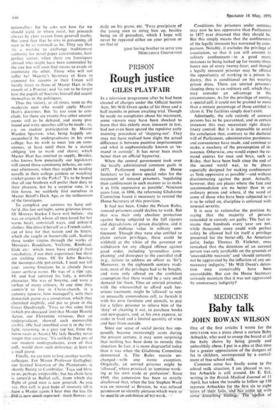PRISON
Rough justice
GILES PLAYFAIR
In a television programme after he had been cleared of charges under the Official Secrets Acts, Mr Will Owen spoke of his three and a half months in prison awaiting trial. Though he made no complaints about his treatment, some viewers may have been shocked to learn that this elderly man, innocent in law, had not even been spared the repulsive early morning procedure of 'slopping-out'. They may not have realised how slight the actual difference is between punitive imprisonment and what is euphemistically known as 're- mand in custody'. It has never been much better than an official hypocrisy.
When the central government took over the locally administered common gaols in 1877, Parliament required the Home Secretary to lay down special rules for the treatment of remand prisoners, 'regulating their confinement in such manner as to make it as little oppressive as possible'. Nineteen years later, in 1896, the reforming Gladstone Committee found it necessary to remind the Home Secretary of this provision.
It had not been. Under the Prison Rules, remand prisoners could decline to work. But that was their only absolute protection against being subjected to the full rigours and degradations of prison discipline, and it was of dubious value in solitary con- finement. Though they were also entitled to claim certain privileges, these could be withheld at the whim of the governor or withdrawn for any alleged offence against good order, including 'groundless com- plaining' and disrespect to the custodial staff (e.g., failure to address an officer as 'Sir'). Moreover, in the eighteenth century tradi- tion, most of the privileges had to be bought, and were only offered on the confident assumption that there would be a very small demand for them. Thus an untried prisoner, with the wherewithal to afford such lux- urious treatment, might be 'allowed' to rent an unusually commodious cell, to furnish it with his own furniture and utensils, to pay for a fellow prisoner to relieve him of the 'duty' of cleaning it out, to purchase books and newspapers, and, at his own expense, to order in food and a limited quantity of wine and beer from outside.
Since our sense of social justice has sup- posedly become increasingly acute during the present century, it may seem surprising that nothing has been done to remedy this
situation. In fact, it is more disgraceful today than it was when the Gladstone Committee denounced it. The Rules remain un- changed—with one ironic exception. Originally, an untried prisoner might be 'allowed', where practical, to 'continue work- ing at his own trade or profession'. Since 1949, this concession has been so strictly disallowed that, when the late Stephen Ward was on remand at Brixton, he was refused permiSsion-toidentify pieturestwhicit were to be used 417- exh i bition Conditions for prisoners under sentence may now be less oppressive than Parliament in 1877 ever dreamed that they should be. But this simply means that the confinement of the legally innocent has worsened by com- parison. Notably, it excludes the privilege of association, so that it can still amount to solitary confinement—in a good many instances to being locked up for twenty-three hours out of every twenty-four; and though a legally innocent prisoner may be offered the opportunity of working in a prison in- dustry, this is conditional on his wearing prison dress. There are untried prisoners sleeping three to an ordinary cell, which they may consider an advantage in the circumstances. As for the privilege of renting a special cell, it could not be granted to more than a minute percentage of those entitled to claim it. The facilities simply don't exist.
Admittedly, the safe custody of accused persons has to be guaranteed, and in certain instances this may necessitate tight discip- linary control. But it is impossible to avoid the conclusion that, contrary to the declared will of Parliament, administrative parsimony and convenience have made, and continue to make, a mockery of the presumption of in- nocence. Otherwise, one would expect the re- mand centres for men and boys, such as Risley, that have been built since the end of the second world war, to be places especially designed for making confinement as 'little oppressive as possible'—and without discriminating against the poor. Actually, however, they are places where the fare and accommodation are no better than in an ordinary prison and where, if the word of some of those who have been subjected to it is to be relied on, discipline is enforced with unusual severity.
It is easy to rationalise the position by saying that the majority of persons remanded in custody are guilty. The fact re- mains that hundreds every year are not, while thousands more could with perfect safety be allowed bail (in itself a privilege preserved for the better-off). An American jurist, Judge Thomas D. Finletter, once remarked that the detention of an accused person was only justifiable on the grounds of 'unavoidable necessity' and 'should certainly not be aggravated by the infliction of any un- necessary indignity.' Mr Will Owen's deten- tion may conceivably have been unavoidable. But can the Home Secretary seriously maintain that it was not aggravated by unnecessary indignity?


































 Previous page
Previous page